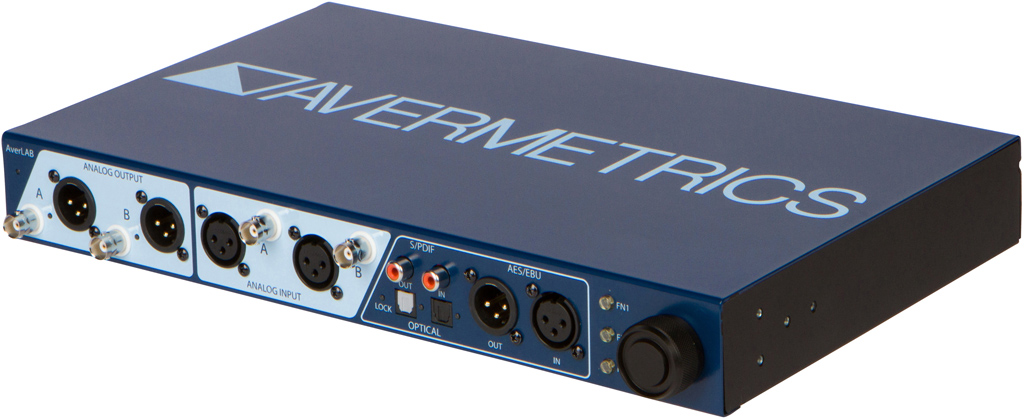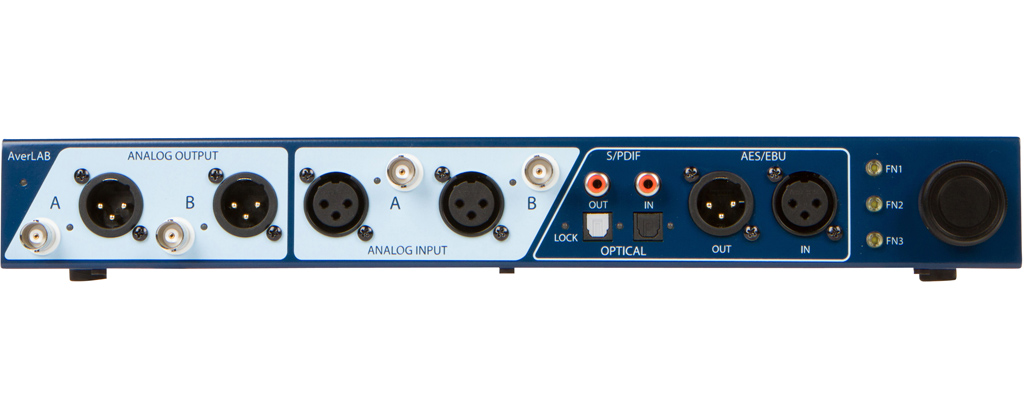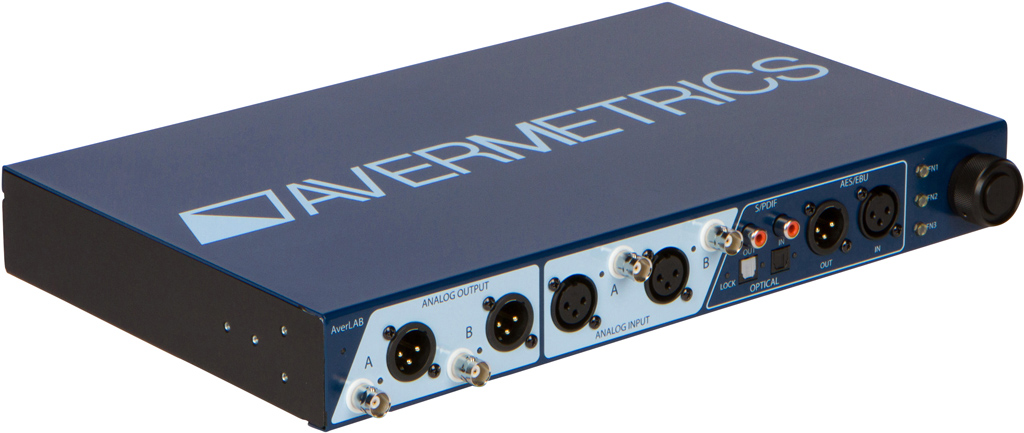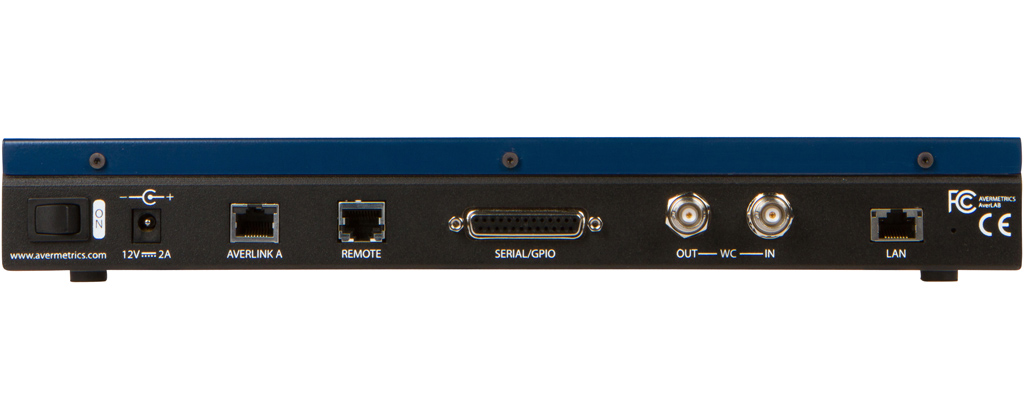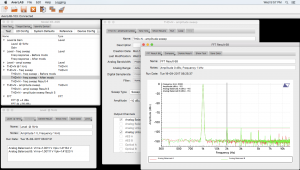Introducing AverLAB
AverLAB, the most affordable and convenient full-featured high-performance audio analyzer ever.
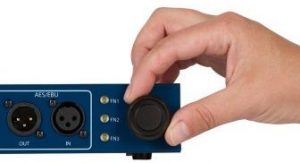
AverLAB is a bench-friendly analyzer that makes audio testing affordable. With fanless, silent operation and cigar-box size, it fits perfectly on even the most crowded benches. Run tests and adjust parameters using front panel controls, without having to clutter your bench with a keyboard and mouse. And AverLAB’s performance and features help you get your day-to-day work done without compromise.
Unlike other portable analyzers, AverLAB is expandable. Very expandable. Ethernet connectivity lets you add an almost unlimited number of AverLine rack test modules of analog, digital and general purpose I/O. Connect multiple AverLABs to make a complete test system. And the built-in I2S interface‡ offers I2C, SPI, and parallel control lines for controlling your digital audio circuits or other outboard gear.
AverLAB works where you do. The under 6 pound unit fits neatly into most standard 15″ laptop bags. And, with no USB tether dictating where to work, you are free to access AverLAB from your workbench, desk, during a meeting, even from home.
Features and Specifications
Analog Audio
Generator
- 2 independent channels, up to 3 oscillators
- Balanced XLR x 2
- Unbalanced BNC x 2
- Frequency range: 10 Hz to 88 kHz, millihertz resolution
- Output level (balanced, max): +26 dBu, 15.5 Vrms
- Output level (unbalanced, max): +20 dBu, 7.75 Vrms
- Flatness, 10 Hz to 40 kHz: ±0.01 dB
- Flatness, 10 Hz to 88 kHz: ±0.05 dB
- Residual THD+N, typical: -110 dB, 0.00032%
- SNR, +26 dBu out, autoranging, typical: 145 dB
- SNR, +26 dBu out, single range, typical: 126 dB
Analyzer
- 2 independent channels, simultaneous operation
- Balanced XLR x 2
- Unbalanced BNC x 2
- Frequency range: 10 Hz to 88 kHz
- Input level (balanced, max): +26 dBu, 15.5 Vrms
- Input level (unbalanced, max): +20 dBu, 7.75 Vrms
- Flatness, 10 Hz to 40 kHz: ±0.01 dB
- Flatness, 10 Hz to 88 kHz: ±0.05 dB
- Residual THD+N, typical: -112 dB, 0.00025%
- SNR, autoranging: 145 dB
- SNR, single range: 122 dB
Digital Audio
Generator
- Formats: AES/EBU, Coaxial S/PDIF, Optical (TOSLINK), ADAT
- Native ADAT supports SMUX0, SMUX2, and SMUX4
- Sample Rates, all formats (kHz): 44.1, 48, 88.2, 96, 176.4, 192
- Frequency range: 10 Hz to 88 kHz
- S/PDIF output level: > 2.5Vp-p (75Ω load)
Analyzer
- Formats: AES/EBU, Coaxial S/PDIF, Optical (TOSLINK), ADAT
- Sample Rates, all formats (kHz): 44.1, 48, 88.2, 96, 176.4, 192
- Frequency range: 10 Hz to 88 kHz
- S/PDIF input level: 350 mVp-p minimum
Sync
- Sync sources: Internal, External (Word Clock), AES/EBU, Coaxial S/PDIF, Optical S/PDIF, ADAT, Auto
- Jitter (100 Hz to 88 kHz, RMS, typical): < 20 ps, any sync source
- Auto sync chooses input signal for sync, or internal sync if built-in generator is in use
- 5V nominal Word Clock output for syncing external devices
- Word Clock input (350 mVp-p minimum) for external sync
System Features
- Assignable front panel controls
- Ethernet connectivity, supports DHCP, Static IP, AutoIP
- Quiet fan-less design
- 8 lines of general purpose IO
- I2S, SPI and I2C interfaces‡
- Front panel signal LEDs, always active
- 15W power dissipation, 40W/12V power supply
- Universal power supply, 100-240V, 47-63 Hz
- Weight: 5.5 lbs, 2.5 Kg
- Size: 13.5 in x 8 in x 1.75 in (343 mm x 203 mm x 44.5 mm)
Software
- Identical features for PC and Mac
- Easy setup: install a single application file, connect AverLAB, Go!
- Assignable channel names
- Compare results with earlier runs
- Save and load graphs and tables
- AverLAB firmware automatically updates to match software
- Project files hold all the tests and data as you work
Tests
- Level/Gain
- Level vs. Frequency
- Level vs. Amplitude (Linearity)
- THD+N
- THD+N vs. Frequency
- THD+N vs. Level
- Signal to Noise (SNR)
- SNR vs. Frequency
- SNR vs. Level
- Crosstalk
- Crosstalk vs. Frequency
- Crosstalk vs. Level
- FFT, 1024 to 32768 points, w/averaging
†Specifications and features subject to change without notice.


